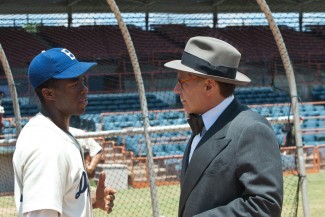Jackie Robinson’s struggles, triumphs brought to cinematic life in ’42’

Brian Helgeland’s stellar new biopic about Jackie Robinson proves at least one point: Using tired Hollywood cliches can sometimes work wonders. 42 is by no means original when it comes to structure, pacing and its ultimate payoff. This being a sports movie, one can expect the requisite setbacks, triumphs and pivotal games. However, what makes Helgeland’s movie a cut above the rest is that Robinson’s real-life story has as much to do with the sport of baseball as it does with American history. This crucial player broke barriers and proved himself in a professional sport that was traditionally off-limits for the African-American community.
Anchoring the film is a fine performance from Chadwick Boseman. He brings a sense of vigor and dedication to the central role. Even though Robinson often turned the other cheek, we as audience members can see the fire brimming beneath the surface of Boseman’s portrayal. In one particularly unsettling scene, Robinson endures so many racist comments from the opposing team’s manager (Alan Tudyk) that it’s a wonder he can have so much self-restaint.
The movie focuses on the years when Robinson rose through the ranks from minor league play to the big leagues on the Brooklyn Dodgers. Along the way, several people influence the player’s trajectory, including Branch Rickey (Harrison Ford), the irascible owner of the Dodgers. Together, Robinson and Rickey help the major leagues see the value in diversity. When the going gets tough (and it certainly gets tough), the two lean on each other for advice and support.
Ford’s portrayal at first seems comical. He puts on an exaggerated accent and growls his lines, often with a cigar hanging from his lips. If this weren’t professional baseball, I would call foul. But somehow the performance works in the picture; it’s not hard to imagine Rickey being simultaneously ornery and groundbreaking. The movie also doesn’t back away from the reality of Rickey’s intentions: He is, after all, the owner of the Dodgers. Having Robinson succeed was a financial opportunity as much as it was a civil rights issue.
There’s also fine supporting work from Nicole Beharie (Rachel Robinson), Christopher Meloni (Leo Durocher, the adulterous manager of the Dodgers) and Hamish Linklater (Ralph Branca, Robinson’s teammate).
Helgeland, who directed and wrote the script, keeps the pacing at full throttle. There are numerous games featured in the film, often serving as chapter headings in Robinson’s progress to his ultimate achievement: Rookie of the Year on the Brooklyn Dodgers. There may be one too many montages, and some of the historical facts are glossed over, but for a weighty, two-hour biopic, 42 covers a lot of ground.
At times, it does seem that the Robinson character is the least fleshed out. This is probably because of the constant focus on Rickey. Ford’s acting is so solid (perhaps his best role in a decade) that Robinson’s internal struggle and external persona are never fully developed. However, there is one scene that perfectly captures the pain of what Robinson had to endure. After taking so many racist comments from the opposing team, and never lashing out like he could have done, Robinson heads for the hallway to the locker room and breaks down. His deep weeping, all done out of sight from the crowds and the opposition, shows how much hurt this American legend underwent. The path to breaking this barrier was not easy, and Helgeland reminds us that it’s not always about strikes and home runs. Baseball can be a reflection of American society.
42 should be remembered come Academy Award time.
By John Soltes / Publisher / John@HollywoodSoapbox.com
-
42
-
2013
-
Written and directed by Brian Helgeland
-
Starring Chadwick Boseman, Harrison Ford and Nicole Beharie
-
Running time: 128 minutes
-
Rated PG-13 for thematic elements including language
-
Rating:





